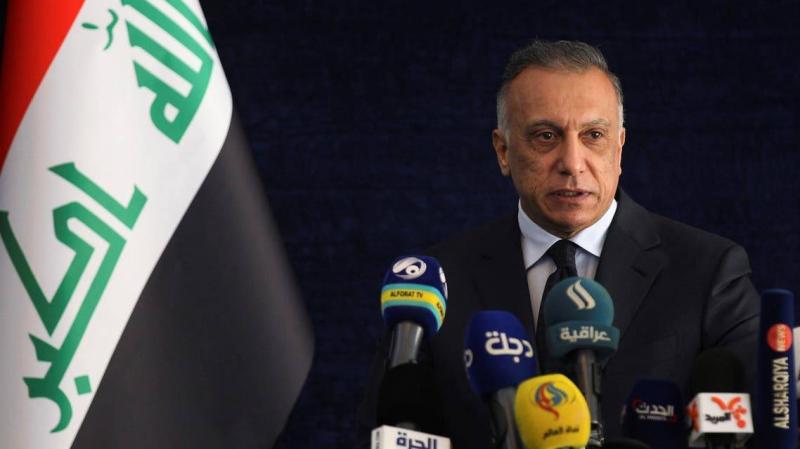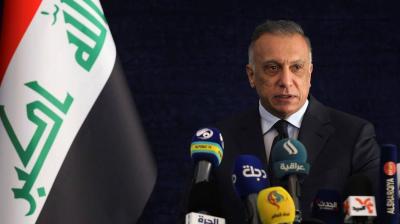Under the title "Iraq: What is the Future of Al-Kadhimi's Political Career After the Elections?", Sky News published a special article noting that this is the first election in Iraq in which the Prime Minister is not a candidate. Mustafa Al-Kadhimi, the Iraqi Prime Minister, summarized the difference between this election cycle and the previous four in terms of ensuring its integrity and transparency. However, observers believe that Al-Kadhimi remains one of the strongest consensus candidates with a good chance of forming the new government post-elections, especially since past experiences suggest that the elections will not produce a strong bloc sufficient for forming a government independently from others, meaning that it may take months for various parties to agree, as has been the norm.
Commenting on Al-Kadhimi's government, what it has accomplished and what it has not, and his political future after the elections, Mohanad Al-Janabi, a political science professor, stated in an interview with Sky News Arabia: “From a constitutional, legal, and even practical political perspective, we can say there is nothing preventing the appointment of a Prime Minister not running in the elections, and thus not elected. There is a precedent in this regard with the appointment of former Prime Minister Adel Abdul-Mahdi, who formed the government prior to the current one, which fell due to the October protests.”
Al-Janabi continued, “If Al-Kadhimi’s government had been given the opportunity, meaning if the challenges and internal political forces were less severe and reckless, we could have witnessed significant achievements during his tenure. Yes, he had good intentions, but the challenges were greater and stronger. Al-Kadhimi’s government committed, for example, to holding early elections immediately upon its announcement, to monopolizing weapons in the hands of the state, and to holding accountable those responsible for killing protesters and activists. Now, at the end of the government’s term, none of those promises have been fulfilled, except for the organization of the early elections, which raise a thousand questions regarding reassuring the Iraqi voter about their integrity and dispelling their concerns.”
The Iraqi academic added: “Politically, Al-Kadhimi managed to delay the internal struggle rather than resolve it; specifically, we refer here to the postponed struggle between the state and non-state forces, from militias and armed factions, and the struggle among these factions themselves. We are talking about the ambitions of the Sadrist movement and the ambitions of the factions that use the Popular Mobilization Forces to advance their policies and impose their dominance. Yes, the government managed to delay these conflicts, but not in accordance with the interests and necessities of Iraqi national security, which requires a strict approach to these armed groups. While this is considered an achievement for Al-Kadhimi, it is provisional and not strategic.”
It can be noted that due to various internal and external interactions, the Iraqi crisis is significantly linked to external factors, as noted by Al-Janabi, who added: “Al-Kadhimi's government deserves credit for adopting a clear and stable foreign policy for the first time, reflecting Iraqi national interests regarding external relations. This has inherently helped Al-Kadhimi delay the internal struggle without resolving it, as previously mentioned.” Al-Kadhimi has somewhat managed to lessen Iran's absolute influence on Iraq through extensive openness to the Arab world, reassuring the Iraqi interior that there are opportunities to rid themselves of Iranian control through the Arab gateway.
Al-Janabi noted, “In addition to his efforts to diversify energy sources, which are important means to break free from Tehran’s dominance, but this policy requires sustainability and continuity.” However, what if a government representing forces linked to the Iranian axis arises, or if certain external orientations are imposed on the next Prime Minister within the framework of quotas, as Al-Janabi questions, adding: “This would certainly undermine the policies that Al-Kadhimi initiated, especially in the external aspect, even if he himself were tasked with forming the government. If he were to be renewed, more restrictions would be placed upon him to gain his government's confidence.”
The Iraqi academic stated that the possibilities are wide open, and the agreement between the Iraqi political blocs to assign someone to form the next government after the elections on Sunday, along with the outlines of its internal and external policies, all represent significant challenges and complex issues. He continued, "Amid all this, the legitimate authority — the people and the protesters — are watching a scene that has greater potentials for complications and deterioration if traditional political forces do not place national interests above all else."
He concluded, "Unfortunately, there are no signs in this direction, thus the scene is open to several possibilities, the best of which is the continuation of Al-Kadhimi's government’s approach, along with holding accountable the pillars of the regime for their crimes, and a genuine move towards state-building. The worst scenario is a continued subjugation to regional tensions and interventions, revolving within the cycles of external-dependent quotas." Al-Kadhimi's government, formed about a year ago, gained the trust of the Iraqi Parliament on May 7, 2020, following his assignment to form it in April of that year.




